
Waste management company Casella (NASDAQ: CWST) reported revenue ahead of Wall Street’s expectations in Q4 CY2024, with sales up 18.9% year on year to $427.5 million. The company’s full-year revenue guidance of $1.79 billion at the midpoint came in 3.2% above analysts’ estimates. Its non-GAAP profit of $0.41 per share was significantly above analysts’ consensus estimates.
Is now the time to buy Casella Waste Systems? Find out by accessing our full research report, it’s free.
Casella Waste Systems (CWST) Q4 CY2024 Highlights:
- Revenue: $427.5 million vs analyst estimates of $417.9 million (18.9% year-on-year growth, 2.3% beat)
- Adjusted EPS: $0.41 vs analyst estimates of $0.16 (significant beat)
- Adjusted EBITDA: $95 million vs analyst estimates of $99.69 million (22.2% margin, 4.7% miss)
- Management’s revenue guidance for the upcoming financial year 2025 is $1.79 billion at the midpoint, beating analyst estimates by 3.2% and implying 14.9% growth (vs 23.9% in FY2024)
- EBITDA guidance for the upcoming financial year 2025 is $417.5 million at the midpoint, above analyst estimates of $413.2 million
- Operating Margin: 4.3%, in line with the same quarter last year
- Free Cash Flow Margin: 7.7%, down from 9.5% in the same quarter last year
- Market Capitalization: $6.80 billion
“We finished the year strong, reporting records yet again across our key financial metrics in 2024, with growth of over 20% in revenues, Adjusted EBITDA and Adjusted Free Cash Flow,” said John W. Casella, Chairman and CEO of Casella Waste Systems.
Company Overview
Starting with the founder picking up garbage with a pickup truck he purchased using savings from high school, Casella (NASDAQ: CWST) offers waste management services for businesses, residents, and the government.
Waste Management
Waste management companies can possess licenses permitting them to handle hazardous materials. Furthermore, many services are performed through contracts and statutorily mandated, non-discretionary, or recurring, leading to more predictable revenue streams. However, regulation can be a headwind, rendering existing services obsolete or forcing companies to invest precious capital to comply with new, more environmentally-friendly rules. Lastly, waste management companies are at the whim of economic cycles. Interest rates, for example, can greatly impact industrial production or commercial projects that create waste and byproducts.
Sales Growth
A company’s long-term sales performance can indicate its overall quality. Any business can put up a good quarter or two, but many enduring ones grow for years. Over the last five years, Casella Waste Systems grew its sales at an incredible 15.9% compounded annual growth rate. Its growth beat the average industrials company and shows its offerings resonate with customers.
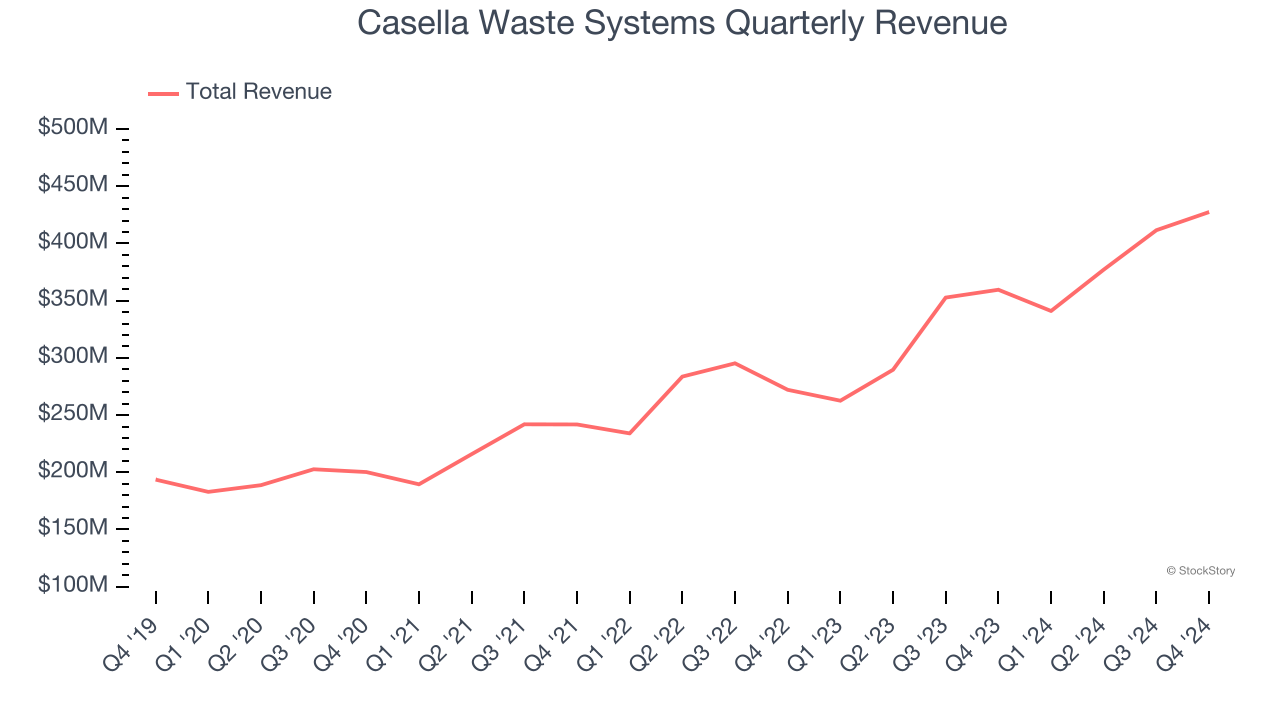
We at StockStory place the most emphasis on long-term growth, but within industrials, a half-decade historical view may miss cycles, industry trends, or a company capitalizing on catalysts such as a new contract win or a successful product line. Casella Waste Systems’s annualized revenue growth of 19.8% over the last two years is above its five-year trend, suggesting its demand was strong and recently accelerated. 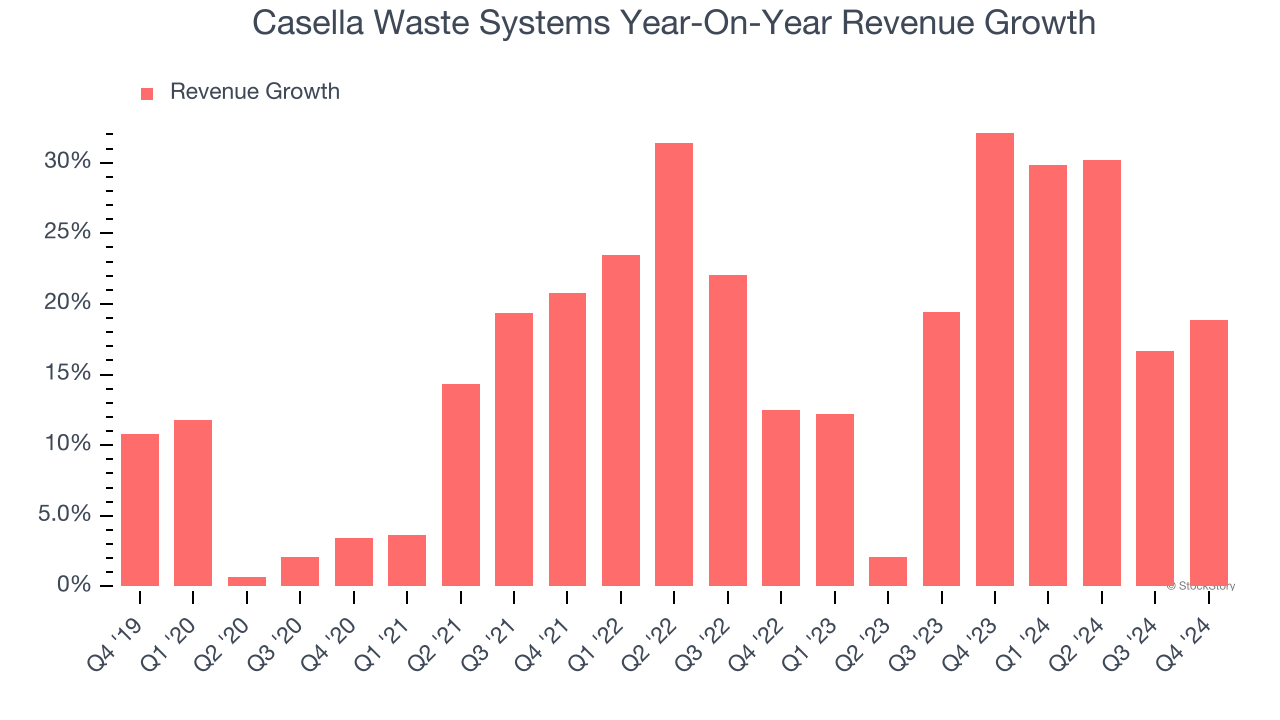
This quarter, Casella Waste Systems reported year-on-year revenue growth of 18.9%, and its $427.5 million of revenue exceeded Wall Street’s estimates by 2.3%.
Looking ahead, sell-side analysts expect revenue to grow 11.7% over the next 12 months, a deceleration versus the last two years. Despite the slowdown, this projection is commendable and implies the market is factoring in success for its products and services.
Unless you’ve been living under a rock, it should be obvious by now that generative AI is going to have a huge impact on how large corporations do business. While Nvidia and AMD are trading close to all-time highs, we prefer a lesser-known (but still profitable) stock benefiting from the rise of AI. Click here to access our free report one of our favorites growth stories.
Operating Margin
Operating margin is an important measure of profitability as it shows the portion of revenue left after accounting for all core expenses – everything from the cost of goods sold to advertising and wages. It’s also useful for comparing profitability across companies with different levels of debt and tax rates because it excludes interest and taxes.
Casella Waste Systems was profitable over the last five years but held back by its large cost base. Its average operating margin of 6.9% was weak for an industrials business. This result is surprising given its high gross margin as a starting point.
Analyzing the trend in its profitability, Casella Waste Systems’s operating margin decreased by 3 percentage points over the last five years. The company’s performance was poor no matter how you look at it - it shows operating expenses were rising and it couldn’t pass those costs onto its customers.
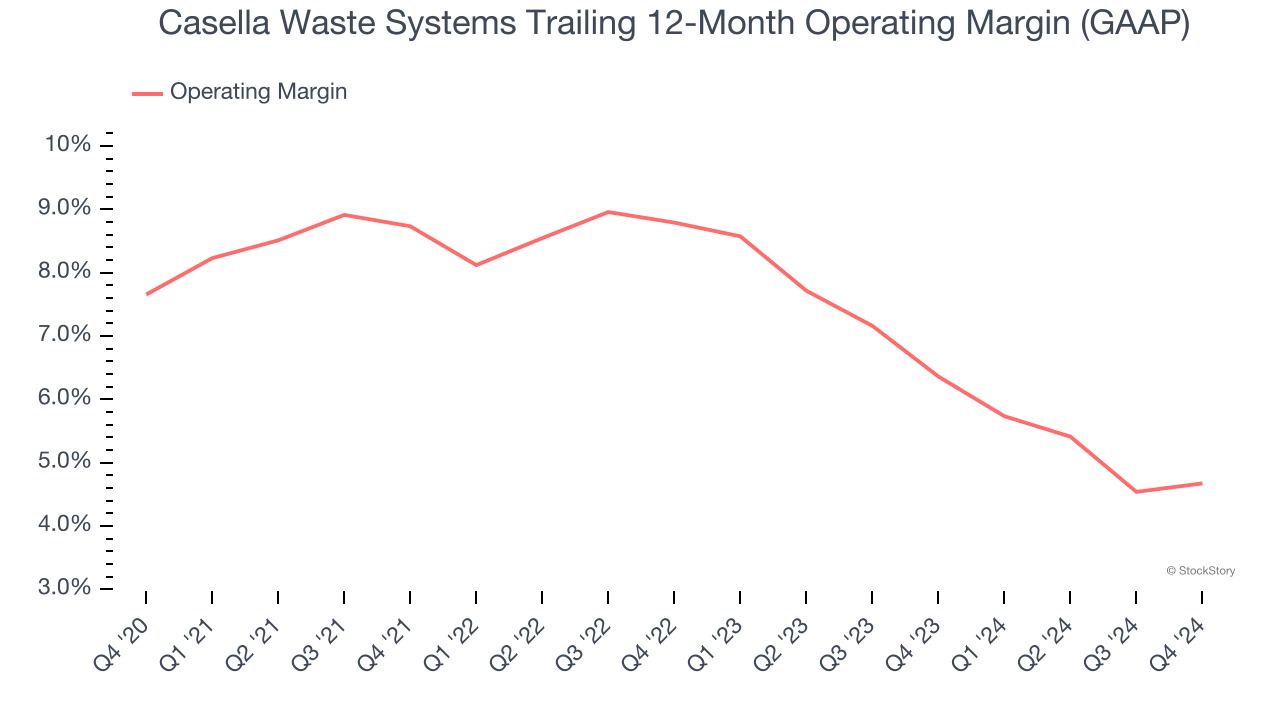
In Q4, Casella Waste Systems generated an operating profit margin of 4.3%, in line with the same quarter last year. This indicates the company’s cost structure has recently been stable.
Earnings Per Share
Revenue trends explain a company’s historical growth, but the long-term change in earnings per share (EPS) points to the profitability of that growth – for example, a company could inflate its sales through excessive spending on advertising and promotions.
Casella Waste Systems’s EPS grew at a weak 1.2% compounded annual growth rate over the last five years, lower than its 15.9% annualized revenue growth. This tells us the company became less profitable on a per-share basis as it expanded.
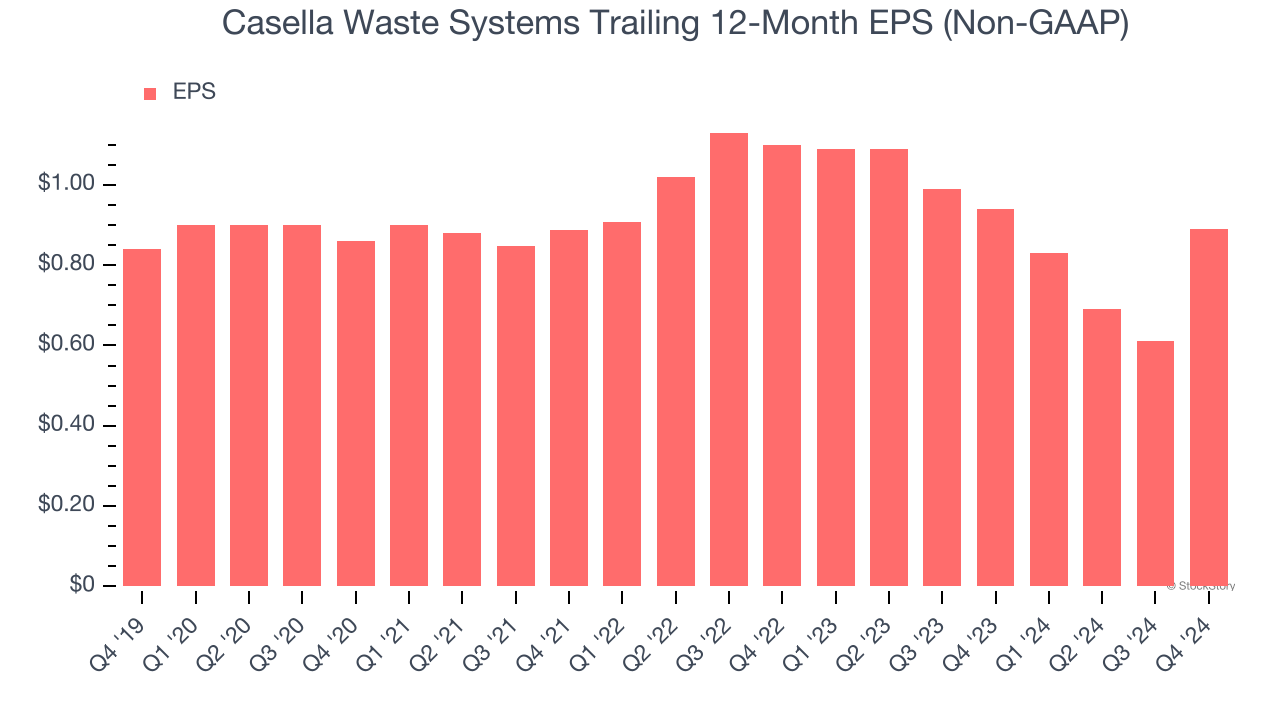
Diving into the nuances of Casella Waste Systems’s earnings can give us a better understanding of its performance. As we mentioned earlier, Casella Waste Systems’s operating margin was flat this quarter but declined by 3 percentage points over the last five years. Its share count also grew by 30.6%, meaning the company not only became less efficient with its operating expenses but also diluted its shareholders. 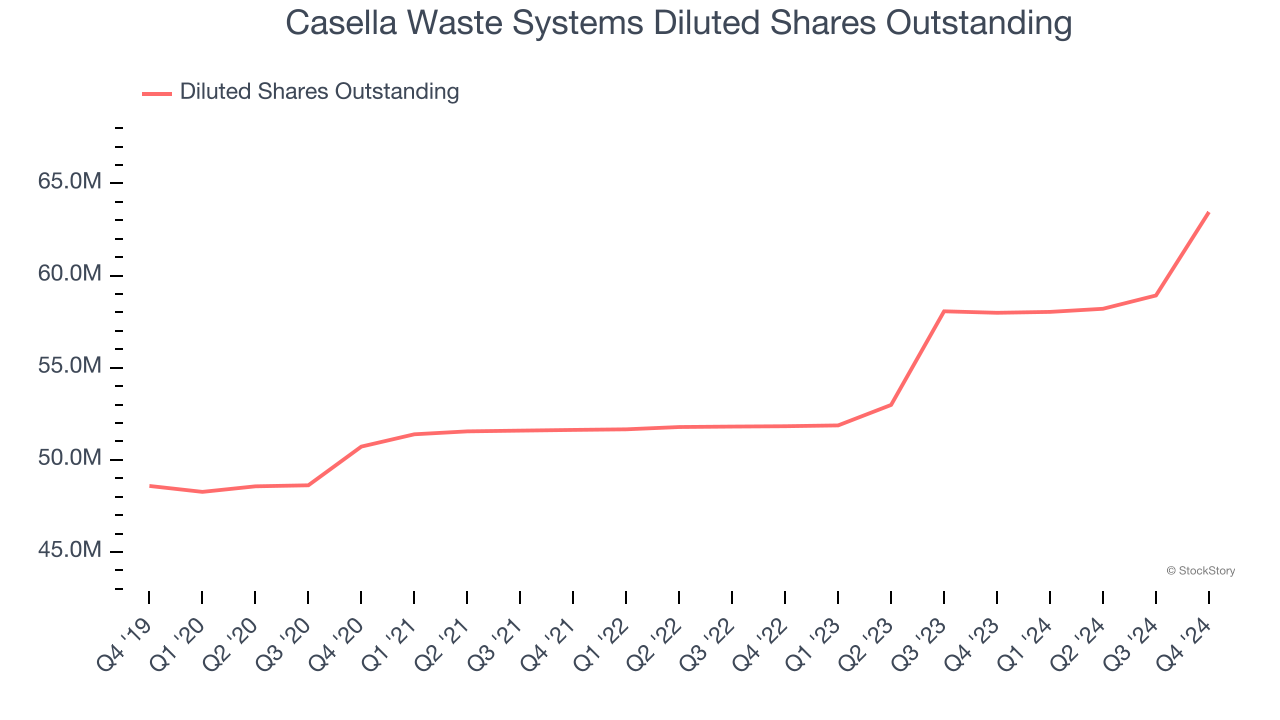
Like with revenue, we analyze EPS over a shorter period to see if we are missing a change in the business.
For Casella Waste Systems, its two-year annual EPS declines of 10.1% show it’s continued to underperform. These results were bad no matter how you slice the data.
In Q4, Casella Waste Systems reported EPS at $0.41, up from $0.13 in the same quarter last year. This print easily cleared analysts’ estimates, and shareholders should be content with the results. Over the next 12 months, Wall Street expects Casella Waste Systems’s full-year EPS of $0.89 to grow 13.3%.
Key Takeaways from Casella Waste Systems’s Q4 Results
It was great to see Casella Waste Systems beat analysts’ revenue and EPS expectations this quarter. We were also glad its full-year revenue guidance was much higher than Wall Street’s estimates. On the other hand, its EBITDA missed. Overall, we think this was a decent quarter with some key metrics above expectations. The stock remained flat at $106.45 immediately after reporting.
Should you buy the stock or not? If you’re making that decision, you should consider the bigger picture of valuation, business qualities, as well as the latest earnings. We cover that in our actionable full research report which you can read here, it’s free.




